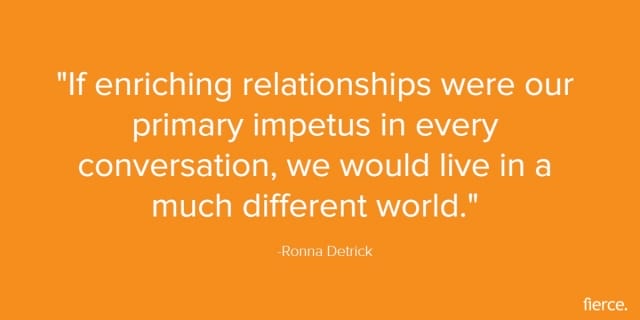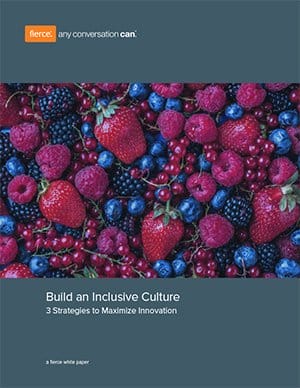
Each year, organizations invest a lot of time and millions of dollars into diversity programs.
It’s an important and valuable effort, to be sure. Any and everything we can do to increase our awareness and appreciation of differences, to create higher levels of inclusivity, to honor the distinctiveness of individuals the better!
But diversity training, in-and-of-itself, is not enough.
What must we do to enable and sustain the change needed and wanted?
First, we must acknowledge the complexity of our current state of affairs. The political climate has spurred heightened awareness and remains rife with tension.
Voices have been raised (and thankfully heard), while others still remain silenced. Gender equality has improved, but sexual harassment continues.
More and more employers provide medical benefits for domestic partners while implicit (and explicit) bias remains insidiously unnamed.
So yes, progress is being made to foster a more inclusive culture. And still, more is required.
At Fierce, we know what must be deeply woven into our organizations and overarching culture in ways that go far beyond metrics, mandatory training, or new policies and procedures when tacking diversity and inclusion challenges.
In addition to every effort we can apply toward diversity and inclusion, we must be committed to having the kinds of conversations that make a difference.
Leaders and managers with direct reports (and vice versa!), peer-to-peer, up, down, across, in meetings, in one-on-ones, at the coffee machine, in feedback, in confrontation, all the time. Conversations that make a difference, well…make a difference!
How to Practice What We Preach
All of us know this intuitively and none would disagree. The issue here is not the “why”, it’s the how. Actually practicing what we preach. And just like D&I efforts, that is far easier said than done.
I spend a lot of time in classrooms, conference rooms and boardrooms — honored to talk with our clients about the “how” of these kinds of conversations. No matter where I am, no matter the industry, size of the company, or part of the country, all of them feel the struggle: the need to take action that is more than *just* implementing needed training.
Training that actually changes people and the culture itself.
We talk together about how much work it is to say what matters instead of what we think the other person can handle. We discuss how we do not have the needed, practical tools and skills to step into difficult conversations.

We acknowledge that we are far more influenced by our biases than we often recognize or want to admit. We commiserate about how the very things we’re afraid will happen (if we say what we actually think and feel) happen anyway — and even sooner — when we choose avoidance over courage.
What I hear and experience, again and again, is that D&I efforts are not enough.
Don’t get me wrong…these efforts are profoundly needed and worth every bit of intention and investment. As a society, we are woefully unprepared to step into the complexity of the present, let alone the future, without them. And…we need more.
At Fierce, we talk about 4 Objectives that if intentionally included in the conversation, have the capacity to change the world for the better…one conversation at a time.
1. Interrogate Reality
One of the most important aspects of all diversity training is helping individuals acknowledge that their view of things, people, politics, and reality itself is not objective.
It is impacted by background, cultural heritage, the part of the country they grew up in, family of origin, the books they read, the news channel they watch, and so much more.
The opinions, attitudes, and beliefs that each of us holds are functioning as a filter or lens through which we view and interpret everything we see and experience around us, 100 percent of the time.
When we recognize this, we are also forced to recognize that everyone else has a viewpoint as well – which could be radically different from our own. Not wrong. Different.
To Interrogate Reality means that I consciously and intentionally pay attention to the inalienable truth that my perspective and yours are not the same. Even more importantly, I choose to be curious instead of demanding to be right.
This is hard work. It takes discipline and practice. But when held as commitment, it profoundly impacts how we step into (and remain in) conversations that test our limits, our patience, and our understanding.
Isn’t that, at least in part, what D&I training is about? Hard work. Discipline and practice. Commitment. Understanding.
2. Provoke Learning
Deeply held opinions combined with lived-experience tend to create convictions. The stronger our convictions, often, the less open we are to learn.
Sure, we want others to learn, but we want them to see things our way, to come over to our way of thinking. The thing is, we’re not all that compelled to have to learn things ourselves — about ourselves.
To Provoke Learning is a two-way street that assumes and intends, within each conversation, that both of us will learn. For me, that means that I am the one who needs to be willing to learn first. *sigh*
Robert Redford, the founder of the Sundance Film Festival, is one of our much-used examples for what this looks and sounds like. He begins meetings by saying, “I’ll tell you what I think and then I want you to tell me what I’m missing. I’m inviting you to influence me and I’d like to be different when this conversation is over.”
Imagine the strides we’d continue to make toward the awareness and appreciation of diversity and inclusion if this were our lived practice!
3. Tackle Tough Challenges
We are masters at procrastination — especially when it comes to having difficult conversations, to taking on the things that are taking up so much space in our brains, draining so much of our energy, costing us more than we can possibly count.
But the longer we put things off, the higher the chances things will only get worse.
How does this play out in the context of D&I? Well, we have generations of data in our country alone that validates the impact of avoidance, of not saying what needs to be said (and allowing others to be heard), of not tackling the challenges before us in proactive, brave, and honoring ways.
As leaders, as employees, as peers, as friends and family members, we must be willing to step into conversations instead of crossing our fingers and hoping the problem will disappear. That time will heal all wounds, that if we ignore it, it will go away.
We must be willing to tackle tough challenges so that we can not only overcome them, but create the corporate cultures, families, and world we all desire and deserve.
4. Enrich Relationships
This objective, though undeniably important, is all-too-often the one that gets forgotten or overlooked. In truth, only offering D&I training without the critical emphasis on relationships themselves, ends up feeling and sounding like lip-service…not the authentic, significant, and needed change intended.
If enriching relationships were our primary impetus in every conversation, we would live in a much different world.
And isn’t that what D&I training is all about? The desire to create a different, and better world? Relationships — and the conversations that enrich them — is where we must start.
Tags: #Cultural Change, #Workplace Conflict





